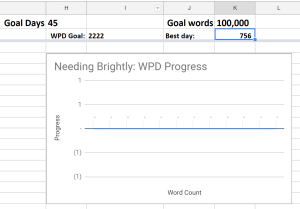Cuspical Data
Last post I talked about the uncertainty of “that time” between an agent submitting a manuscript to a publisher and when a writer gets a response from the publisher in the form of a rejection or a contract.
Thing the First: A Conversation on Time on Cusp
I posed these questions to Marshall Ryan Maresca, a local Austin published author:
- Is there a correlation between the number of requests for a full manuscript and the possibility that it’ll get picked up?
- Are there months where publishers generally make decisions on contracting to publish a novel?
- …
- How long would a publisher sit on a manuscript they’ve asked for before coming back with a decision? I’d heard a few snippets back at the last ‘Con, but… you’ve been through the grinder a few times now.
“Man, let me tell you, that interstitial period in a writers career, where you’ve made that massive level-up achievement of Getting An Agent, but still haven’t sold… it’s rough. And it is just because you’re in limbo. You’ve got people asking for it, so that’s good. But it can just take forever. I mean, it was about two and half years for me. [Author], I think four. As for months when things happen and when they don’t? I mean it all depends. I hear that a lot DOESN’T happen in the summer months, for example, because editors are often going to cons and such each weekend. I know that it was about a year between when my agent sent Thorn to [publisher] and when she started reading it, and she really didn’t read it until I went up and said a polite hello at WorldCon. And my agent was just telling me a story of one editor who kept going, “Yeah, I know, I’m going to read that soon” on someone else’s manuscript for years. I think Martha Wells made the joke of “glaciers honk at the publishing industry to move faster.”
“(But, on the flip side, you get something like [another author], whose agent sold his manuscript a week after signing him.)Thus, the big unhelpful answer is, “Who knows, man?”


 By my count I blew five weeks and generated ~100k words on a novel I’m regretfully consigning to the metaphorical trunk. And what’s funny is that I’m sure that if this novel was written forty years ago, it’d be on its way to my agent.
By my count I blew five weeks and generated ~100k words on a novel I’m regretfully consigning to the metaphorical trunk. And what’s funny is that I’m sure that if this novel was written forty years ago, it’d be on its way to my agent.

 I’ve been wrestling with getting my next novel started before getting a full-time, paying gig. And score is trunk novels: 5, Shlomi manuscripts: 0. It kept coming across lifeless, a narration of facts and events that even extensive external and internal dialog didn’t help. I’m a
I’ve been wrestling with getting my next novel started before getting a full-time, paying gig. And score is trunk novels: 5, Shlomi manuscripts: 0. It kept coming across lifeless, a narration of facts and events that even extensive external and internal dialog didn’t help. I’m a  Just finished hand edits of Last Run, a monster novel (originally 185k or closing on 800 pages). I’ll have a much lower word count when I’m done, if for no other reason than most post-apoc manuscripts are best salable when they’re under 120k. Or so I’m told. This month, at least.
Just finished hand edits of Last Run, a monster novel (originally 185k or closing on 800 pages). I’ll have a much lower word count when I’m done, if for no other reason than most post-apoc manuscripts are best salable when they’re under 120k. Or so I’m told. This month, at least. First, old business
First, old business I’m juggling too many books that aren’t finished. “Last Run” needs a 40% diet, and I’ve been plowing away at edits. “Zepps” has a hit list of dozens of changes (see my previous post:
I’m juggling too many books that aren’t finished. “Last Run” needs a 40% diet, and I’ve been plowing away at edits. “Zepps” has a hit list of dozens of changes (see my previous post: